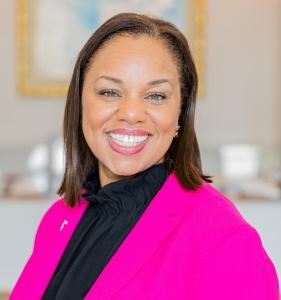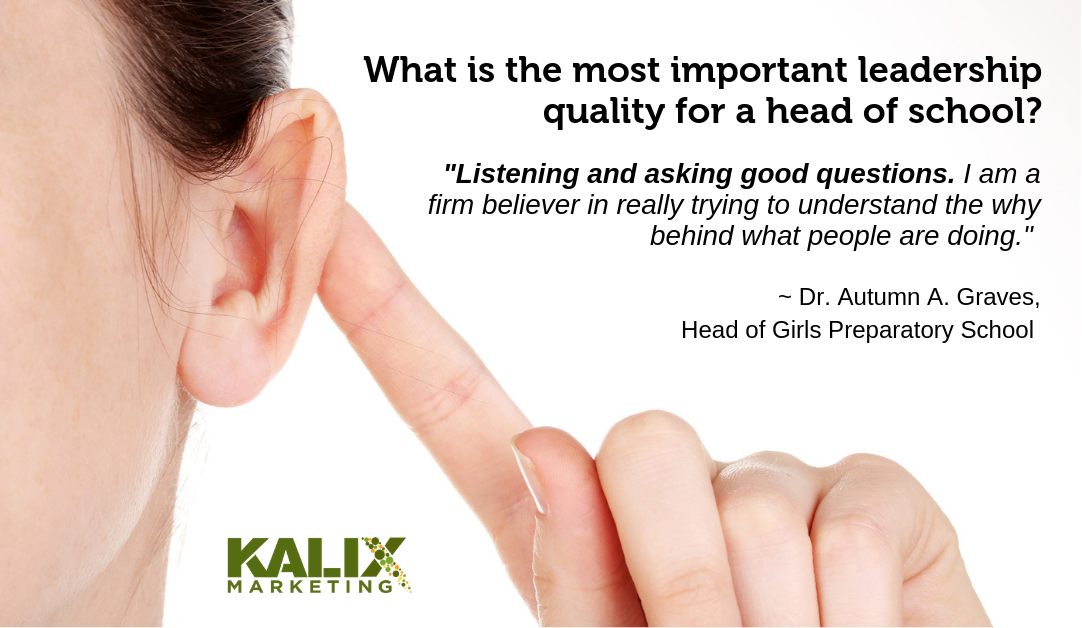For nearly three decades, Dr. Autumn Adkins Graves has focused on leadership development, particularly for young women. As Head of Girls Preparatory School in Chattanooga, Tennessee, she relies on her listening skills—and a question her mother would ask—to guide GPS and its mission and to foster the next generation of female leaders.
Kalix Marketing: What is the most important leadership quality for a head of school?
Dr. Autumn Adkins Graves: Listening and asking good questions. I am a firm believer in really trying to understand the why behind what people are doing. The book A More Beautiful Question: The Power of Inquiry to Spark Breakthrough Ideas by Warren Berger really helped to affirm that it’s a good approach. It has helped me to resolve conflict and stress, to open up to create new ways of thinking. Berger writes that you need to ask ‘why?’ five times before you get to the root of it.
This is my approach to parenting, too, because it was my mother’s approach. From the time I was a child, she would ask me, ‘Tell me what was going through your head that made you decide to do that?’ It was a way for me to become more reflective and self-manage.
If there is an emergency or if we need to act quickly, though, I will say to my own children and to my students, ‘Now is not the time for questions.’
Kalix: What is the most underrated quality?
Dr. Graves: Patience. I don’t think people realize just how patient I am. [Chuckles.] I have learned it over time. I work really hard at it. So much of our work as heads of school means that we need to have a long viewpoint. I am thinking about the impact of decisions in five, 10, or 15 years. Oftentimes you need to lose the battle to win the war. Being patient and strategic in your thinking are key. You don’t want to take two steps forward only to end up taking two back. You have to be patient. Maybe those two steps forward take a long time but are solid steps that won’t require backtracking.
I work on being patient with myself, too. I like to be successful and achieve, but when you are working with a whole community, you can’t function at a quick pace. I think of the African proverb: ‘If you want to go fast, go alone; if you want to go far, go together.’ I use that lesson with myself and my approach to my work.
Kalix: What was your first job in education and what did it teach you about leadership?
Dr. Graves: My first job was at Mercersburg Academy working with Headmaster Walter Burgin Jr. At age 22, I had an important administrative job as the director of special programs. I was responsible for social, cultural and arts programs and non-curricular activities such as speaker series, all-school symposiums, boarding activities and the service program. In rural Mercersburg, PA, there wasn’t a lot going on in 1994! It was early-Internet, so I used the phone book a lot. I was also the ninth-grade boys’ dorm mom, coached girls soccer and taught history during a faculty member’s medical leave.
One of the many lessons I learned from Walter was that time matters. Email was just coming out, and Walter, who had worked at IBM, was a forward thinker. He said that if it takes more than three email exchanges to resolve questions, you should meet in person. I still use that today. So much is lost in written word, oddly enough.
I also learned about the pastoral nature of being a head of school. I often think about how much I hold around people’s personal situations—a divorce, a sick child, a dying parent—and how much I need to hold with grace and compassion. As educators, we are in a service business, and so much of our work is about how we create and hold spaces of grace.
It is much harder to do that work now because people are litigious and quick to point out inequities. When I arrived at Mercersburg, they had recently stopped paying for the male faculty’s dry cleaning. Today we think differently about gender equity.
I often say that I have to manage two bottom lines. I need to meet our school’s mission and be in the black at the end of the year. That’s the fun part for me. If I had to do just one or the other, it would not be nearly as interesting of a leadership or management opportunity.
Kalix: What is your best advice for independent school leaders?
Dr. Graves: I was recently on a women’s leadership panel, and I said that I think a lot about and need to say this more: You are enough. You may not be the right fit for the school where you are, but you are enough for someone else. It’s about finding fit. It’s gut. For me, it’s also how a place makes me feel. Where do I think I can help to create opportunities for solutions to be implemented? What is the school’s challenge they are trying to resolve? What new opportunity does the school want to realize?
We are always striving to be better. With that as the impetus, I ask if this is a place where I can make a difference. Part of my evaluation is asking if the community will appreciate my leadership approach and who I am as a person, as well as considering the people and resources available to help me curate to meet the mission. All independent school missions are similar. It’s the history, culture and values that are the difference-makers.
 About Dr. Graves
About Dr. Graves
Prior to her appointment in 2014 as Head of Chattanooga’s Girls Preparatory School, Autumn Adkins Graves held significant leadership roles at Mercersburg Academy (PA), Breck School (MN), Sidwell Friends (D.C.), Friends Seminary (NY), and Girard College (PA). Her deep commitment to community leadership, nonprofit management, and change advocacy include participating in Leadership Philadelphia and Philadelphia’s Junior League and serving on the World Class Education and Talent Development Strategy Team for World Class Greater Philadelphia. She is a past trustee of the Philadelphia Film Office, the Public Health Management Corporation, the Library Company of Philadelphia; Shipley School (PA) and other nonprofits. Current board memberships include the University of Tennessee-Chattanooga Chancellor’s Advisory Roundtable, the Southern Association of Independent Schools, Creative Discovery Museum, The Head’s Network, and Women’s Fund of Greater Chattanooga.
Dr. Graves earned a rhetoric and history degree from the University of Virginia, a M.Ed. in private school leadership from Teachers College, Columbia University, and a doctorate in higher education management from the University of Pennsylvania. She and her husband, Vann, have a son and daughter.
Found value in this interview? Check out a recent interview with Paul Barker, President of Our Lady of Good Counsel.
Leaders on Leading: Paul Barker, President of Our Lady of Good Counsel

